Ferguson: Brown jury decides not to charge officer
- Published
Aerial footage showed cars, shops and businesses ablaze
A US grand jury has decided not to charge a police officer over the fatal shooting of unarmed black teenager Michael Brown in Ferguson, Missouri.
State prosecutor Robert McCulloch said the jury had exhaustively examined the evidence but Mr Brown's family said they were "profoundly disappointed".
News of the ruling sparked the worst night of rioting yet in Ferguson.
Shots were fired and cars and buildings set alight as police fired tear gas to break up the crowd of protesters.
Ferguson decision: A timeline of events
Police officer Darren Wilson shot dead Michael Brown, 18, in the St Louis suburb on 9 August. There followed nights of rioting in Ferguson and protests across America.
President Barack Obama joined the teenager's family on Monday in appealing for calm, urging Americans to accept the decision was "the grand jury's to make''.
The case has stoked racial tensions in the US, where many in the African American community called for Mr Wilson to be charged with murder.
The BBC's Aleem Maqbool reports seeing more vandalism and looting after the ruling than on any night in August.
'Heart and soul'
The jury's decision was announced on Monday. Hundreds of protesters milled around the police department in Ferguson, following the news on radios and mobile phones.
Explaining the decision, Mr McCulloch said the jury's job had been to separate fact from fiction, and that some witness statements had been contradicted by physical evidence.
State prosecutor Bob McCulloch: No "probable cause" for indictment
"These grand jurors poured their hearts and soul into this process," he said.
Protesters have been chanting, "Hands up, don't shoot" - a reference to statements by some witnesses who said Mr Brown had had his hands up in apparent surrender to the officer when he was shot.
Police say there was a struggle between the teenager and the officer before the shooting.
In his own testimony, Mr Wilson says that before the shooting Mr Brown pushed him back into his car, hit him and briefly grabbed his drawn gun.
The jury was made up of 12 randomly picked citizens - nine white and three black.
At least nine votes were needed in order to issue an indictment.
Mr McCulloch said the biggest challenge for his office was the "24-hour news cycle and an insatiable appetite for something - for anything - to talk about".
Fire and gas
After the announcement, Mr Brown's family issued a statement saying they were "profoundly disappointed that the killer of our child will not face the consequence of his actions".
Outside the police department, Mr Brown's mother burst into tears.
The BBC's Aleem Maqbool abandoned an interview as tear gas landed near him
Some in the crowd began throwing objects at a police line.
Shortly afterwards shots were fired, and protesters were seen vandalising police cars, at least one of which was set on fire. Police responded with smoke and tear gas.
Firefighters tackled a large blaze and heavy black smoke at a retail building, with reports of a pharmacy and a pizza shop also on fire.
Several other buildings were broken into and looted.
The Federal Aviation Authority said it was restricting the path of some flights into St Louis amid the unrest.
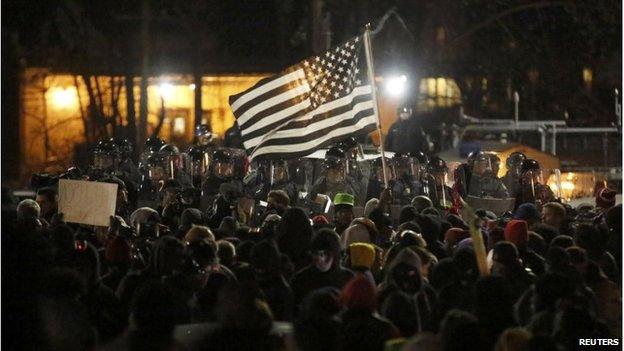
Protesters gathered outside the Ferguson police department as the decision was made
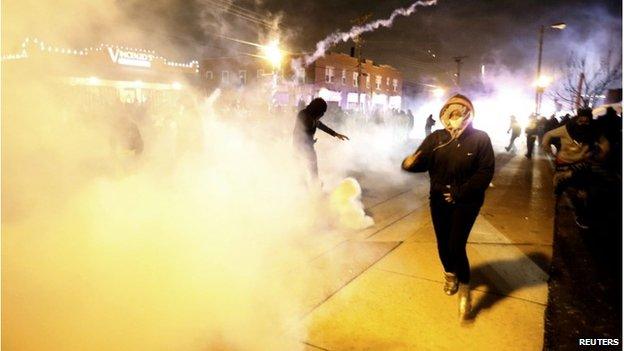
Police responded to violence with smoke, pepper spray and tear gas
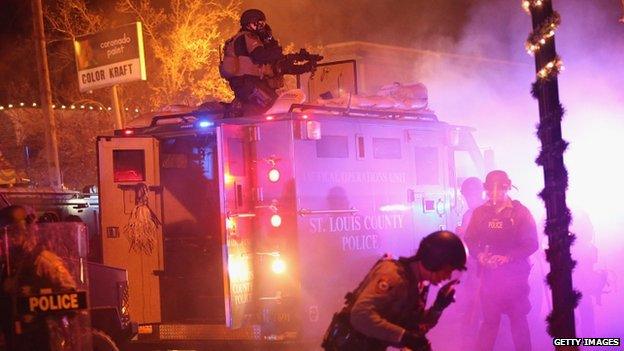
Protesters taunted heavily armed national guard troops, telling them to "go fight the Taliban"
Thousands of people also protested in other US cities including Los Angeles, Philadelphia and New York. Protesters in Oakland, California, blocked traffic on a major motorway.
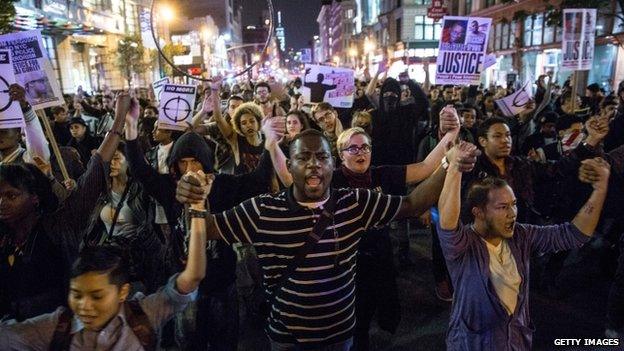
Protesters also marched through the streets of New York after hearing the news
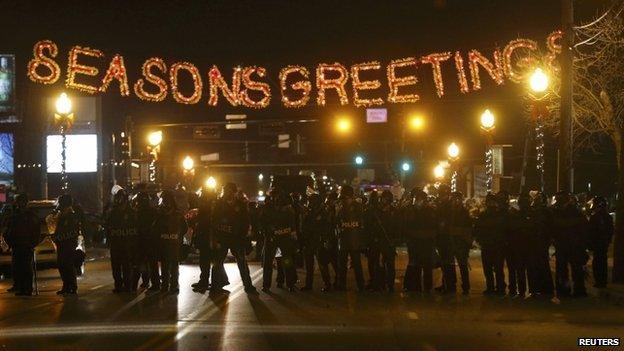
Scenes from Ferguson were in stark contrast to President Obama's calls for calm